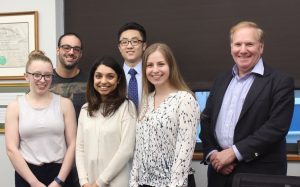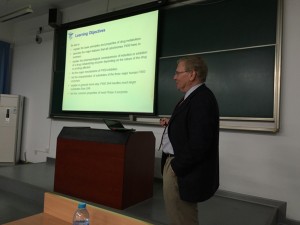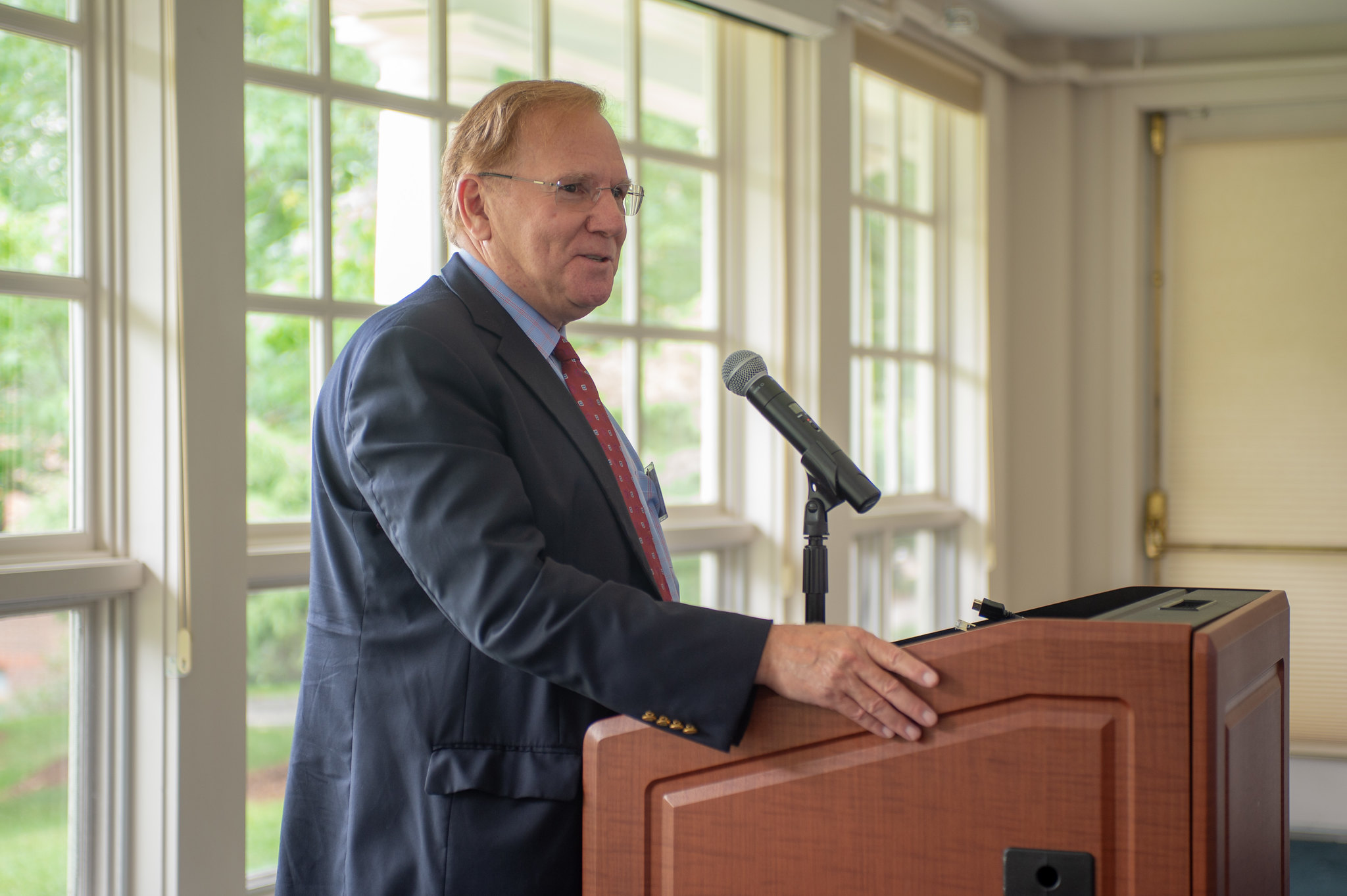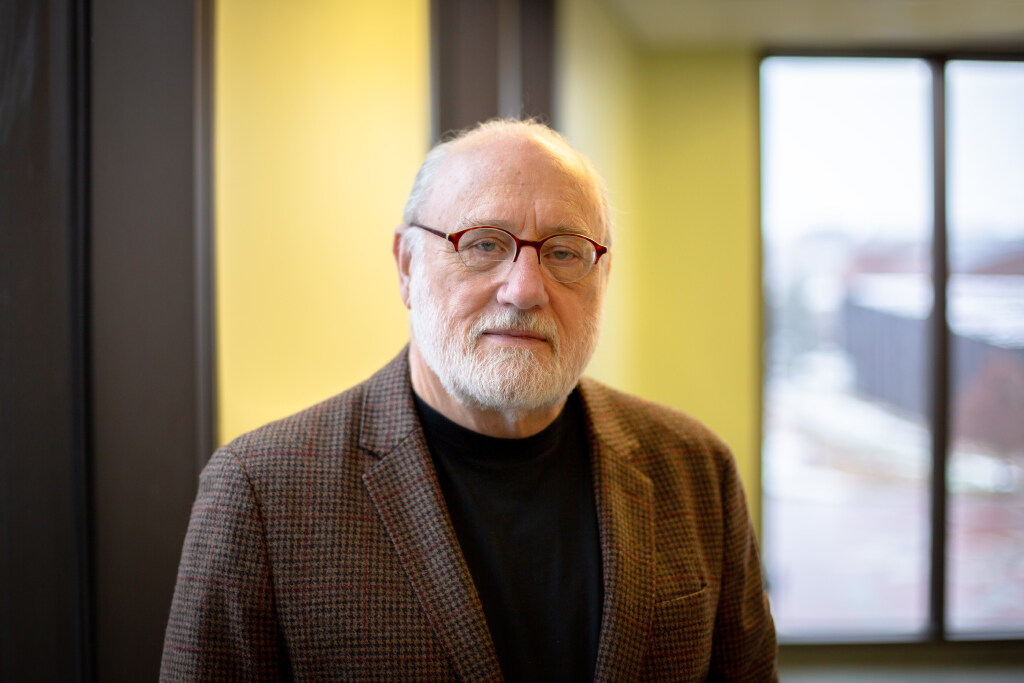James (Jim) Halpert, Ph.D. will retire from the University of Connecticut and the School of Pharmacy on October 8, 2020. Halpert is a former dean (2014-2019) of the School of Pharmacy, a professor of Pharmaceutical Sciences and researcher focused on the structure and function of cytochromes P450 of the 2B and 3A subfamilies. Over the course of his 40-year career Halpert worked across two countries and four states, gaining experiences rich with exposure to diverse people and ideas.
The following Q & A, on the eve of his departure, offers his thoughts on his time at UConn and elsewhere and provides insight for anyone looking for ways to grow their careers in academia and the pharmaceutical sciences:
How did your wide range of academic and work experiences both in the U.S. and internationally help you as a leader?
In my view, the lasting value of an experience is proportional to the skills and/or insights gained. My professional career has certainly involved considerable trial and error, and I can’t claim that everything I learned helped me personally. I am, however, grateful to share some of the major insights regarding academic leadership in the hope that they may benefit other people.
To begin with, I think it is important to distinguish individuals who take on positions of increasing responsibility at the same institution where they started as an assistant professor from those who move to a new university each time they climb the leadership ladder. Many faculty spend their entire career at UConn, and some of the most effective leaders are drawn from the ranks of such faculty members. In addition to strong leadership and people skills, these individuals benefit tremendously from the institutional knowledge and the personal credibility gained over multiple decades. The opposite leadership trajectory is to move to a new university each time a major elevation in responsibility occurs. This tends to be more common at universities and in states (in my case Arizona, Texas, and California), where the general and faculty population is more mobile. Therefore, the insights I have gained from my wide range of academic and work experience, including international, may be most applicable to outside leaders in more dynamic environments.

In my opinion, the best such leaders have an excellent understanding of their own values, principles, strengths and weaknesses. They couple this with the ability to draw upon multiple leadership approaches, realizing that each university truly has a unique culture that can be very powerful and determine collective and individual behavior. For example, most public research universities profess similar core values such as excellence, diversity, integrity, and respect. However, in part because of limited resources, few universities can excel in all areas, and therefore they make trade-offs. A typical one is between undergraduate education and faculty research. Accordingly, it is key as a newcomer to understand the “coin of the realm”, in other words what values really matter. Likewise, understanding which other leaders have clout and why is very important. Finally, it is essential to figure out the extent to which the senior university leadership really wants to promote change as opposed to preserving the status quo. That difference determines to a significant extent whether a new leader is viewed positively as a change agent or negatively as disruptive.
What advice do you have for a student beginning their career in pharmaceutical science research or a faculty member starting an independent career?
To students I would say that science can be very rewarding. In fact, the one silver lining to the coronavirus pandemic is the renewed interest in science among the public. However, a scientific career is also very demanding, uncertain, and full of more frustration than satisfaction many times. Therefore, it is essential to be driven by intellectual curiosity and to have the patience and resilience to pursue a problem for a long time before getting much positive reinforcement. The choice of a mentor for the Ph.D. degree can have a huge impact on later opportunities. Choose a faculty member who is still really excited about the day to day operations in the laboratory, ideally someone who is still doing some experiments himself or herself. Strive to emerge from your Ph.D. work as a “complete scientist”, capable of thinking of a problem, figuring out what pilot experiments to perform, formulating and testing a hypothesis, collecting publishable data, and writing, submitting, and revising manuscripts. If you decide to do a post-doctoral fellowship, understand the trade-off between a high-powered research group where you will get little attention from the mentor but have the opportunity to do groundbreaking work, and a smaller group where you may struggle less but also achieve less.
To a new faculty member I would say that the problem you pick to explore can determine the rest of your career. Create a niche for yourself in an important and expanding field. The niche will allow you to survive the competition, and the important field will ensure that others are interested in your work. Always be on the lookout for new and improved ways to solve the research questions you are pursuing; don’t get stuck on the approaches you yourself master. Make sure to publish your work in a timely fashion and to get out and promote it, ideally in short oral presentations at first. Make sure every talk you give is first-rate. You never know what influential people might be listening and get turned off if you do a mediocre job. A few great people in your laboratory in the beginning can make a world of difference, so recruit enthusiastically and energetically. Always promote your people and give them appropriate credit. In my experience, credit is not finite but grows when shared and shrinks when taken unduly.

What achievements gave you the most satisfaction during your academic career?
Today’s funding pressures often cause researchers to jump around from project to project every few years. As a basic scientist, I was very fortunate to obtain external funding from various sources for 35 years to pursue a fundamental research question and basically answer it. That gave me tremendous intellectual satisfaction as well as producing findings of lasting value to my field. As an administrator, I would cite my service as department chair in Texas and as dean in Connecticut, which represent opposite ends of the spectrum of challenges.
In Texas during a time of strong financial support, I was able to achieve my dream of building a chemical biology program. Later, I became director of the environmental health sciences center, and our department developed a center in addiction research. At our peak, funding increased five-fold, and we rose from 61 to 21 in the NIH rankings of pharmacology departments. The five-year review of me and the department resulted in additional resources from the university president and dean of medicine.
My five years as dean at UConn were dominated by financial austerity and a significant loss of faculty who could not be replaced. Nonetheless, we were able to increase philanthropy and almost double research funding, laying the foundation for an improved national ranking. Most important, by working together we were able to upgrade and strengthen virtually all aspects of the organization. These include but are not limited to: student recruitment and admissions, student services, academic affairs, financial affairs, marketing and communication, alumni affairs, and physical infrastructure. Thanks to these changes, I am confident that the School of Pharmacy will be able to withstand the COVID-19 pandemic and the subsequent changes in higher education that are inevitable.
What are your plans for the next chapter of your life? Will you continue in pharmacy/pharmaceutical sciences in any way?
As much as my professional career has meant to me, I have no intention of exceeding my shelf life. My personality is such that I can get incredibly excited about and immersed in various ventures for decades but can also abandon them fairly quickly when the thrill is gone. Our immediate plans are to move to Tucson, Arizona where I have several friends, including at the University of Arizona. I will pursue come kind of adjunct appointment but am really not sure how much involvement I want, especially until the pandemic is under control. Like most people, I would like to think that I have gained valuable knowledge over the course of my life and am happy to share it, but I don’t want to become intrusive with younger colleagues. A modest amount of consulting and professional society work will be enjoyable.
A three-hour hike in the desert and mountains every other day is about right. Then, once the pandemic is under control, I am looking forward to having a lot of visits in Tucson from old friends with whom I have been reconnecting by phone and email. I definitely want to make extended visits to see my friends in Sweden during the summers. I can still understand spoken and written Swedish perfectly and want to see whether I can become fluent again and get my American accent under control. Finally, as much as my career is grounded in science, too many pivotal events have occurred to me during my life that defy a simple, rational explanation. Therefore, I plan to continue to develop my spiritual side, as I have done over the past ten years with support from my wife Li.
Jim Halpert was the recipient of the ASPET Bernard B. Brodie Award. In 2016, he received an Award in Excellence from the PhRMA Foundation, and in 2019 he became a fellow of ASPET. Highlights of professional service include: member and chairman of the NIH Pharmacology Study Section; editor of Drug Metabolism and Disposition; secretary-treasurer and president of ASPET; treasurer of ISSX; member of the International Advisory Committee for the 14th through 23rd Symposia on Microsomes and Drug Oxidations.
The School of Pharmacy wishes him well in his next chapter.



